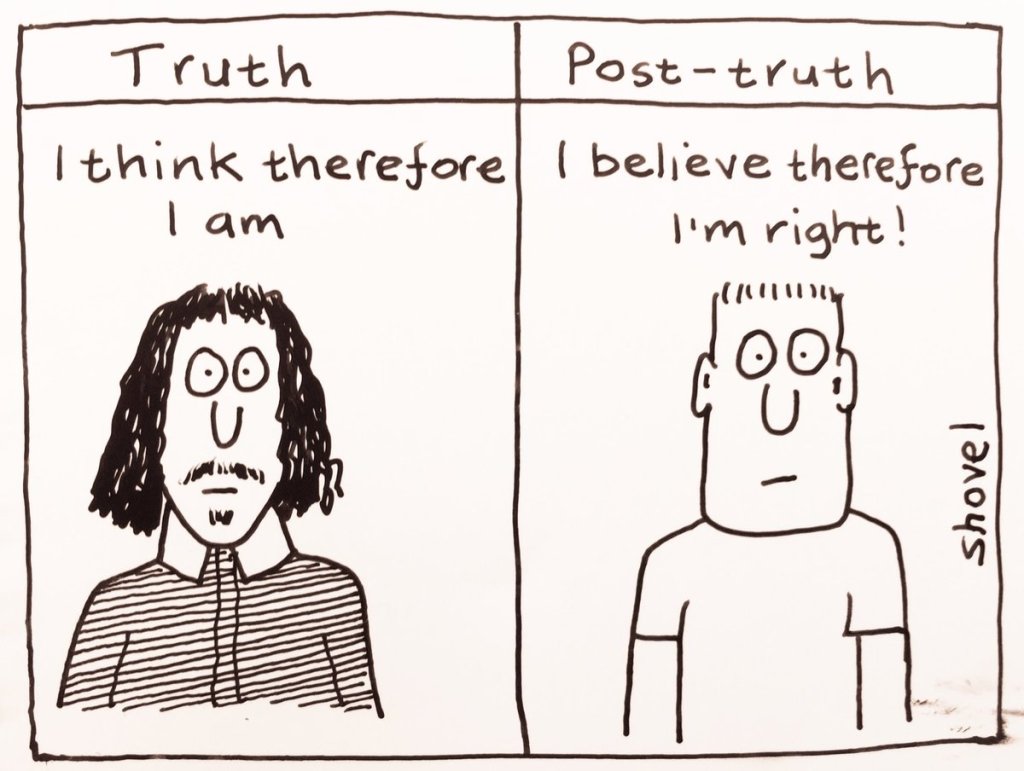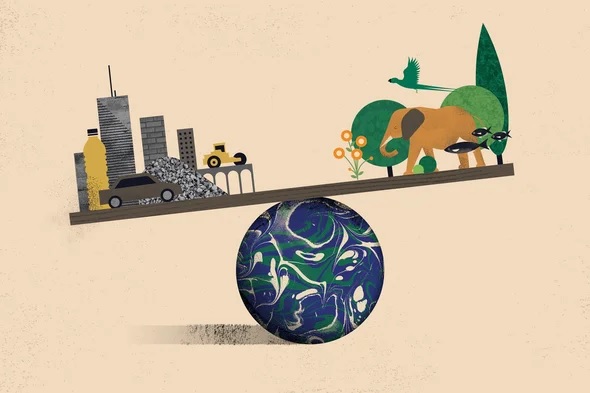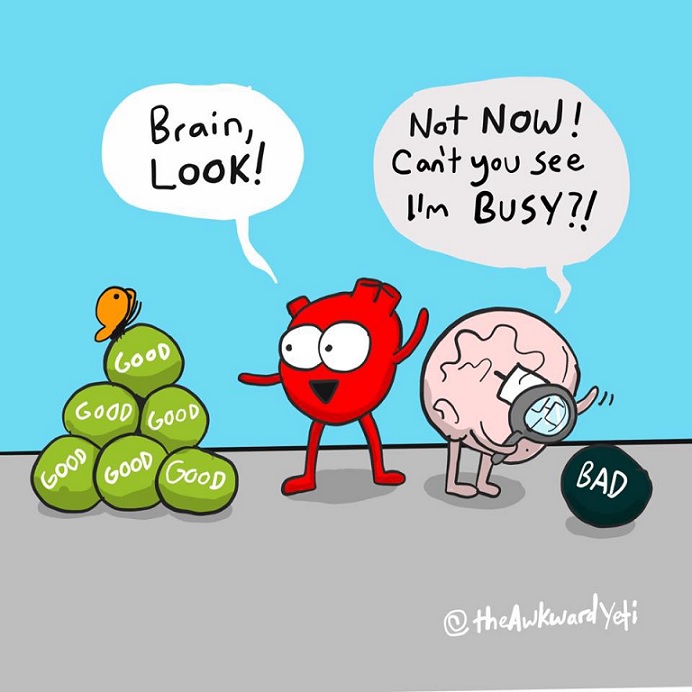
As has been said before, “the world is a mess and getting messier still” (To think or not: Zen, Tolstoy, Depression and Enjoyment).
The number of problems we face is astounding (UN Global Issues). It’s like the world is going to hell in a handbasket and we’re the cause. Go to any zoo, refugee camp or suburb. See for yourself. How can a person enjoy with a clear conscience when so much is wrong?

Even though we know, “The whole surface of Earth is a series of connected ecosystems” and “every factor in an ecosystem depends on every other factor,” we continue to pave over ecosystems with joyous abandon (National Geographic).
But a change from soil and water to roads, suburbs and industry has a funny way of affecting plants and on animals depending on those plants.
We have pollution in the ocean twice the size of Texas (source). We have poverty, crime, racism, road rage, distrust, violence and an epidemic of death by drug addiction. We have cancers and viruses and the doctors and scientists who try to help us get death threats (‘I hope you die’: how COVID pandemic unleashed attacks on scientists).

It’s like nature is out to get us and humans don’t get it. Plants and animals go extinct as economics drive global destruction. People are more irrational than ever and no amount of intelligence, Artificial or otherwise, seems able to save us from ourselves.
So, what’s the answer? Is it escapism and surrender? Is it global conflict and action? Is it ruining your life worrying and not enjoying?
How can a run-of-the-mill human (one of 7.9 billion no less) make a difference, be a good ancestor, live a good life and enjoy good times with love and a calm state of mind?
In such a messed up world what can philosophy do?
Well… a lot actually.
Philosophy comes from the Greek “philein” and “sophia” meaning “lover of wisdom” (source). A lover of wisdom relates to any area where intelligence is shown. Wisdom is the ability to think and act using “knowledge, experience, understanding, common sense and insight” (source). If we valued wisdom more than money, celebrity and immediate gratification, if we practiced wisdom religiously, as in, “with consistent and conscientious regularity” (Dictionary), we could easily solve all our problems both individually and collectively.
Psychology was born from philosophies dating back thousands of years (source). Philosophy is logic. Philosophy is religion stripped of wishful thinking. Philosophy is understanding yourself, other people, the world, and your relationship with the world and other people (source).
“Understanding” means to “stand in the midst of” from Old English understandan meaning “to comprehend, grasp the idea of, receive from a word or words or from a sign the idea it is intended to convey” (Etymology Online).
The answer starts with attention and self-awareness.
According to Kruger and Dunning (1999) without mental tools we can’t see our own incompetence. For example: “hunters who know the least about firearms also have the most inaccurate view of their firearm knowledge, and doctors with the worst patient-interviewing skills are the least likely to recognize their inadequacies” (The more inept you are the smarter you think you are).
There are so many websites endorsing the Dunning-Kruger Effect most people don’t question it, but they should: “Dunning-Kruger Effect Is Probably Not Real“. Truth is, if we’re not paying attention, we’re all susceptible to cognitive biases, as in, “systematic errors in thinking.”
Research shows, for example, there is an asymmetry in our thinking towards negativity, meaning, we register the negative more readily and frequently than positive (Negativity Bias).
But on the flip-side, we’re also susceptible to Optimism Bias whereby our brains are overly optimistic. “If,” for example, “you were asked to estimate how likely you are to experience divorce, illness, job loss, or an accident, you are likely to underestimate the probability that such events will ever impact your life” (source).
Positive events lead to feelings of well being, while negative events lead to risky behavior and not taking precautions (source).
Consciousness is being aware of your environment and body. Self-awareness is the recognition of that awareness. Self-awareness is how you understand feelings, motivations and desires (source). Whether you think overly negative or optimistic can depend on your mood. People are less optimistic in a bad mood and more optimistic in a good mood (source).
A mood is a “temporary state of mind or feeling” (Dictionary). Thinking is a way of dealing with moods. We can think our way out of a feeling by finding solutions to meet the need behind that feeling (University of Cape Town).
According to the World History Encyclopedia (2005, p. 409) the first philosopher was Zoroaster (aka Zarathustra) who lived somewhere between 1500 and 1000 BC (source).
Zoroaster praised “Ahura” (Lord) “Mazda” (Wisdom) and founded “Mazdayasna” which means “Worship of Wisdom.” Before the 6th century BC, philosophy and science were not separated from theology which probably explains how Zoroaster, the world’s first philosopher, started the world’s first monotheistic religion (source).
Imagine that! The first monotheistic God was Wisdom itself!
Starting with Pythagoras (570-495 BC)—who, incidentally, first coined the word “philosophy” (source)—Zoroaster’s followers taught ancient Greeks about the love of wisdom (source).
Pythagoras influenced Plato and Aristotle who influenced Western philosophy which influenced Christianity through medieval scholars like Thomas Aquinas (1225-1274) who developed his own conclusions from Aristotelian ideas.
Zoroaster’s religious philosophy is known for its motto ‘Good thoughts, Good Words, Good Deeds.’ It teaches sharing, generosity and kindness. What could be better? Even the rock star Freddie Mercury (1946-1991) born Farrokh Bulsara got into that.
Zoroaster was also the world’s first proponent of ecology through care of the earth (source).
Let us practice wisdom in thought, word and deed! Let us enjoy thinking, Air and a little ping pong.
We can be lovers of wisdom and save the world, one mind at a time.












 Rational knowledge is knowing what people, things, practices and pleasures make you happy, but wisdom is knowing that things you enjoy do not actually make you happy; happiness comes from within. Insight is feeling that whether or not you believe something isn’t the right question because the answer is what you know through experience.
Rational knowledge is knowing what people, things, practices and pleasures make you happy, but wisdom is knowing that things you enjoy do not actually make you happy; happiness comes from within. Insight is feeling that whether or not you believe something isn’t the right question because the answer is what you know through experience.


 Enjoyment focused on self-interests, cravings, successes and outlooks is like a chunk of fools gold. Egotistical pseudo-enjoyment is pyrite enjoyment.
Enjoyment focused on self-interests, cravings, successes and outlooks is like a chunk of fools gold. Egotistical pseudo-enjoyment is pyrite enjoyment.
 In such moments of contentment you merge with natural things like trees, geese… a lake. Imagine being deep down looking up at the surface. The waves may be rough, but it doesn’t matter to you in the serenity of the bottom.
In such moments of contentment you merge with natural things like trees, geese… a lake. Imagine being deep down looking up at the surface. The waves may be rough, but it doesn’t matter to you in the serenity of the bottom.

 We call “bad” what is bad for us and “good” what increases our advantage but to be ethical you rise above local concerns to become aware of relationships. Likewise, lasting happiness lies in aligning your will with everything around you.
We call “bad” what is bad for us and “good” what increases our advantage but to be ethical you rise above local concerns to become aware of relationships. Likewise, lasting happiness lies in aligning your will with everything around you.
 Anger is controlled by taking the time to consider that life isn’t supposed to be as we expect it to be (Seneca). Dogs on a leash strangle themselves fighting against constraints but we have reason. We can feel happier knowing how to act freely within the length of our leashes ascribed by the universe.
Anger is controlled by taking the time to consider that life isn’t supposed to be as we expect it to be (Seneca). Dogs on a leash strangle themselves fighting against constraints but we have reason. We can feel happier knowing how to act freely within the length of our leashes ascribed by the universe.



 The trouble with wisdom according to Slovenian Slavoj Žižek, is that it’s conformist. Wisdom can be used to rationalize participation in enjoyments better avoided or to avoid enjoyments sadly missed.
The trouble with wisdom according to Slovenian Slavoj Žižek, is that it’s conformist. Wisdom can be used to rationalize participation in enjoyments better avoided or to avoid enjoyments sadly missed.


 At its most basic, our brains are in a two-party system. One side renders decisions based on emotion (like a romantic) and the other bases decisions on reason (like a mathematician).
At its most basic, our brains are in a two-party system. One side renders decisions based on emotion (like a romantic) and the other bases decisions on reason (like a mathematician).























 A philosopher of enjoyment memorizes
A philosopher of enjoyment memorizes